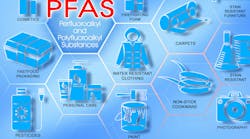JEFFERSON CITY, MO, March 16, 2009 -- The Missouri Department of Natural Resources notified the city of Cameron that it is in violation of state drinking water regulations. The violations relate to byproducts from the city's drinking water disinfection process.
Cameron city officials were notified that the city's most recent set of quarterly tests for haloacetic acids, which typically form as the result of chlorine-based drinking water treatment processes, brought the city's drinking water system out of compliance with state regulations.
Compliance with the regulation is based on a system's average over the past four quarters, with 60 micrograms of haloacetic acid per liter of water being the maximum allowed. The system had been in compliance with the regulation until recent results pushed the system's running annual average to 67 micrograms per liter.
The notice of violation from the state was the first for the Cameron water system since the Department began keeping a database of such information 1984, said Karl Fett, director of the Department's Kansas City Regional Office.
"Cameron has always been -- and as far as we're concerned, continues to be -- one of the region's best run water systems," Fett said. "But unfortunately, we find ourselves working with more and more systems having troubles with disinfection byproduct issues, especially those systems -- like Cameron -- that are served by lakes and reservoirs."
Drinking water systems that use surface water sources, such as lakes and reservoirs, are more likely to experience problems with disinfection byproducts than groundwater systems -- those that receive their source water from wells -- because there is a greater amount of organic material in surface water. The organic material reacts with the chlorine that is required to reduce the level of naturally occurring -- but potentially harmful -- bacteria in the source water.
During the last quarter of 2008, 14 other water systems in Missouri violated the state and federal standards for disinfection byproducts. Many communities have had difficulty since standards for disinfection byproducts were made more stringent in 2004.
Field staff from the regional office have been working with the city's water system operators to adjust the water treatment process to continue to kill harmful bacteria and other microorganisms while better controlling the levels of byproducts such as haloacetic acids.
Haloacetic acids have low human and animal toxicity. The current level of haloacetic acids in Cameron's drinking water, while slightly above the state and federal drinking water standards, is not considered an immediate health concern. If a person were to drink water with elevated levels of haloacetic acids over a lifetime, they may have a slightly increased risk of developing certain types of cancer, including bladder, rectal, or colon cancers. Exposure to high levels of certain types of haloacetic acids has also been shown to cause adverse reproductive or developmental effects in laboratory animals.
The Department of Natural Resources conducted a complete testing of Cameron's source water and drinking water in May 2008 and found them to be in compliance with all state and federal standards. In September, the Department assisted the U.S. Environmental Protection Agency in collecting and testing drinking water samples from 15 sites in the city.
The Department maintains a searchable database of drinking water system test results.
>> Access the Drinking Water Watch database
###


